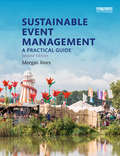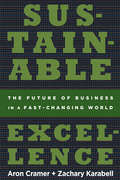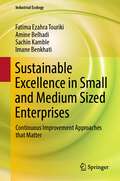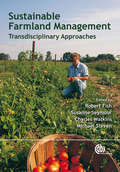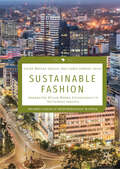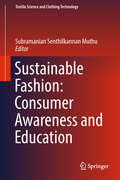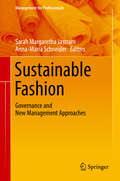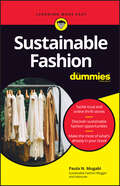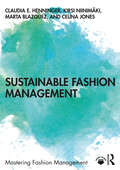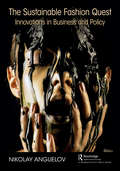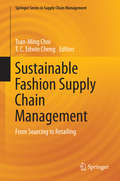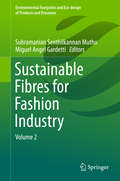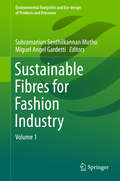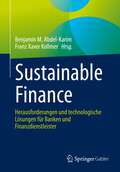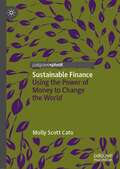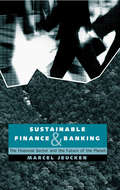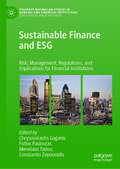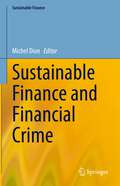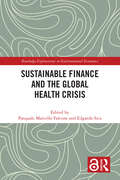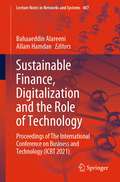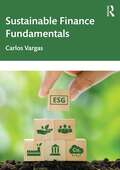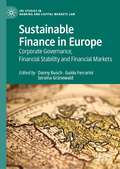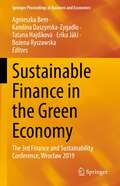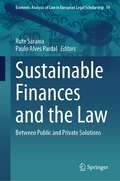- Table View
- List View
Sustainable Event Management: A Practical Guide
by Meegan Lesley JonesGatherings of people for a purpose always have and always will be a part of the human story. Those staging these events have a social and environmental responsibility to manage their impacts and enhance their positive lasting legacies. Written by a leader in the field, this book is a practical, step-by-step guide taking readers through the key aspects of how to identify, evaluate and manage event sustainability issues and impacts - for events of any style and scale, anywhere in the world. The product of tried-and-tested methods, coverage includes numerous examples and case studies from across the world, such as Boom (Portugal), Bonnaroo (USA), Hurricane (Germany), and Glastonbury (UK) Festivals. Readers are provided with checklists for action and tools for measuring performance. This updated second edition includes a detailed review of the new international standard ISO 20121 Event Sustainability Management Systems along with other recent standards and certifications. It expands detail on measuring and reporting event sustainability performance outcomes with explanation of the Global Reporting Initiative Event Organizers Sector Supplement performance indicators. This is the indispensable one-stop guide for event professionals and event management students who want to adjust their thinking and planning decisions towards sustainability, and who need a powerful, easy to use collection of tools to deliver events sustainably.
Sustainable Excellence: The Future of Business in a Fast-Changing World
by Zachary Karabell Aron CramerHow the world's most influential companies are building business strategies that tackle the biggest global challenges.Today's business landscape is changing in fundamental ways: Natural resources are growing ever more scarce and expensive. Technology and changing consumer expectations are making transparency a fact of life. The rise of emerging economies creates vast market opportunities for companies--and better living standards for hundreds of millions. In Sustainable Excellence, Aron Cramer and Zachary Karabell tell the stories of the companies who are transforming themselves by responding to these paradigm shifts and in the process shaping the future.From their work with these Global 1000 companies, Cramer and Karabell know firsthand how business can successfully grapple with big-picture issues like resource scarcity, supply chain complexities, and the diverse expectations of government and the public. In Sustainable Excellence, they tell the story of how Coca-Cola and Greenpeace collaborated on a refrigerator that fights climate change. They show how companies like Best Buy and Nike are transforming the very products they sell to deliver more value to consumers with less waste. They recount how GE and Google created an innovative partnership that is developing "smart grids" that radically reduce energy use. And they show how business leaders like Starbucks' founder and CEO Howard Schultz put sustainable excellence at the center of his company's business strategy.Through these and other fascinating stories, Sustainable Excellence makes the case for a different way of doing business--one that will define both business success and economic vitality in the 21st century.
Sustainable Excellence in Small and Medium Sized Enterprises: Continuous Improvement Approaches that Matter (Industrial Ecology)
by Fatima Ezahra Touriki Amine Belhadi Sachin Kamble Imane BenkhatiThis book is a collection of the up-to-date experience and knowledge about the implementation of sustainable business excellence in a particular context of SMEs. The book uses empirical and practical approach to tackle this issue, which is underdeveloped in the literature. Hence, it could constitute a relevant reference for SMEs managers seeking to manage their operations sustainably, efficiently and resiliently. The book also integrates the smart component to the sustainable business excellence and proves for those who are still skeptical that SMEs could benefit from smart and digital technology in the favor of sustainability and business excellence. Overall, we build on successful initiatives we experienced in real life to guide SMEs in order to be sustainable smart and resilient in the post COVID context which is highly demanding in terms of business excellence and efficiency.
Sustainable Farmland Management: Transdisciplinary Approaches
by Robert Fish Charles Watkins Michael Steven Susanne SeymourExamining the relationship between sustainability and farmland management in differing temporal, spatial and production contexts, this book considers farmland multifuctionality, systems and systemic thinking, the debates over information, knowledge and ethical aspects.
Sustainable Fashion: Empowering African Women Entrepreneurs in the Fashion Industry (Palgrave Studies of Entrepreneurship in Africa)
by Carme Moreno-Gavara Ana Isabel Jiménez-ZarcoThis book analyzes female entrepreneurship in the textile sector in Africa as a phenomenon that favors the social integration and economic development of women in certain geographical areas. It identifies entrepreneurship as an avenue through which women can escape the feeling of being trapped in the home and assert their independence while providing for their families. In the field of fashion, female entrepreneurs in resource-rich Africa have significant opportunities through knowledge of natural resources and cultural traditions, as the use of natural fabrics and original designs is one of the latest trends. This book provides a framework for how African women can develop sustainable fashion enterprises, offering an original and lasting contribution to the field of entrepreneurship.
Sustainable Fashion: Consumer Awareness and Education (Textile Science and Clothing Technology)
by Subramanian Senthilkannan MuthuThis book uses case studies to discuss consumer awareness of and education on sustainable fashion. It highlights how some textile brands have started using consumer awareness tags to educate consumers on the use of their products (e.g. which machine cycle and temperature they should use to wash their products, as well as the best drying conditions in terms of environmental sustainability). Consumer awareness of and knowledge on sustainable fashion is the crux of customer-centric sustainability, and several NGOs and even brands have started taking essential steps to promote this.
Sustainable Fashion: Governance And New Management Approaches (Management For Professionals)
by Anna-Maria Schneider Sarah Margaretha JastramThis edited volume comprises ideas, visions, strategies, and dreams of entrepreneurs, managers, scientists and political experts who share their best practice experience relating to the joint goal of a more sustainable, humanistic, and responsible fashion industry. Readers will find a variety of approaches and strategies that in sum represent a rich pool of insights and cases for anyone interested in the study of new management perspectives and in the systematic advancement of sustainable fashion.In 14 chapters, international authors discuss topics such as Sustainable Business Models, Cradle-to-Cradle, Circular Economy, Human Rights, Ethical Supply Chain Management, Sustainable Fashion Consumption, Certification and Auditing, Traceability, Impact Measurement, and Industry Transformation. Business case studies include H&M, Filippa K, Melawear, Otto, Tauko, and Tchibo. Further brands that are discussed in the book are Prada, Burberry, Hermès, Hugo Boss, and many more. The book demonstrates that sustainable fashion can hardly be realized by just one actor or by using just one business tool or governance instrument. The sustainable transformation of the textile sector requires concerted action of businesses, governments, NGOs, and consumers to clearly demonstrate a coalition for change and a willingness and power to end inhumane and unsustainable business practices in the 21st century. The sum of innovative approaches and solutions presented in this book shows that the momentum for change is strong and that mutual learning, respect and collaboration can lead to interesting and effective new paths of co-creation and shared responsibility in the fashion industry.
Sustainable Fashion For Dummies
by Paula N. MugabiDitch fast fashion and create a more sustainable wardrobe Want to learn how to make more ethical fashion choices? Sustainable Fashion For Dummies will teach you how to pick up new habits that align with a more sustainable future. The rise of fast fashion in recent years has contributed to unsafe work environments, unfair wages, and toxic pollution. With sustainable fashion, you can have groovy clothing and accessories that are produced in an ecologically and socially responsible manner, using quality products and long-lasting materials. You don’t have to sacrifice your natural fashion sense—the sustainable fashion movement is responsible for some of the most exciting new trends. Pick up this easy-to-read handbook for practical tips and strategies on making more environmentally friendly fashion choices. Get started on your sustainable fashion journey Discover inexpensive options for making more eco-friendly fashion choices Make the most of what's already in your closet Master the art of thrift shoppingLet this Dummies guide be your guru as you start making socially and environmentally friendly fashion choices and becoming more thoughtful about what you purchase (or don’t purchase).
Sustainable Fashion Management (Mastering Fashion Management)
by Claudia E. Henninger Kirsi Niinimäki Marta Blazquez Celina JonesThis book provides a holistic and accessible approach to sustainable fashion management. It offers an interdisciplinary and practical outlook, combining theory with practical application from a management perspective and underpinned by the Sustainable Development Goals throughout. The book helps students to gain a better understanding of what sustainable fashion is and how it is implemented across the fashion industry, through business model innovations, innovative designs, new technology and digital approaches, and material innovations. Global case studies are employed throughout each chapter, including fashion companies and events of all sizes, alongside other pedagogical features to aid learning, including key learning points, chapter objectives, and textboxes explaining key terminology. This is an essential textbook for those investigating sustainable fashion, whether from a design or management perspective, providing the knowledge and tools for a future career. It is designed to serve Fashion Business and Management, Fashion Marketing, Fashion Buying and Merchandising and Fashion Technology courses, at all levels, and will also be valuable reading for those already working within the fashion industry and studying for professional qualifications. Online resources include chapter-by-chapter PowerPoint slides and a test bank.
The Sustainable Fashion Quest: Innovations in Business and Policy
by Nikolay AnguelovWhen thinking about lowering or changing consumption to lower carbon footprints, the obvious offenders come easily to mind: petroleum and petroleum products, paper and plastic, even food, but not clothes. When people evaluate ways to lower their personal carbon footprint by changing purchasing habits, they are bombarded with information to avoid petroleum and petroleum products, plastics, paper, even food, but not clothes. Most consumers do not think of clothes as a source of environmental damage. Yet, clothes are made with petroleum products through chemically-laden industrial processes that generate significant pollution. The fashion industry is among the largest organic water polluters in the world, accounting for significant greenhouse gas emissions and generating massive amounts of waste as a function of the frequent discarding of used clothing. In the Dirty Side of the Garment Industry: Fast Fashion and Its Negative Impact on Environment and Society, author Nikolay Anguelov exposed the ecological damage from the fast-fashion business model. In this book, The Sustainable Fashion Quest: Innovations in Business and Policy, the author takes this one step further by focusing on solutions. This book uses the familiar (yet complex) industry of fashion as a lens to examine how business pressures and national and international policies can have both positive and negative social and ecological impacts. It provides an analysis of extant and emerging policies to address the divergence in the ongoing quest to maximize economic development and minimize the social costs of the industrialization process. It also examines emerging technologies and innovative business models that have the potential to revolutionize how fashion is perceived, manufactured, and consumed. This book begins with an introductory letter that outlines the social and environmental issues facing the fashion industry, as well as emphasizing the seriousness and urgency of addressing them. Each chapter then focuses on a major aspect of the industry with an increasing emphasis on policy. The chapters outline the impact of global-level and business-level decisions on the industry’s success, its social and environmental impact, and its relationship to consumers. The goal of the book is to define that transition, explain its challenges, and educate readers on the possibilities to become powerful drivers of change through their professional actions and their personal behavior as consumers. While the book specifically analyzes the fashion industry, it also explains the implications for other industrial sectors. It uses a product everyone is familiar with (we all buy clothes, after all) to examine the decisions, impacts, and policies shaping the industry behind the scenes. The linkages are applicable to other fast-moving consumer goods (FMCG) business sectors, such as consumer electronics, which are starting to face sustainability criticism for relying on a business model of promoting a high frequency of repeat purchasing.
Sustainable Fashion Supply Chain Management
by Tsan-Ming Choi T. C. Edwin ChengThis handbook is a compilation of comprehensive reference sources that provide state-of-the-art findings on both theoretical and applied research on sustainable fashion supply chain management. It contains three parts, organized under the headings of "Reviews and Discussions," "Analytical Research," and "Empirical Research," featuring peer-reviewed papers contributed by researchers from Asia, Europe, and the US. This book is the first to focus on sustainable supply chain management in the fashion industry and is therefore a pioneering text on this topic. In the fashion industry, disposable fashion under the fast fashion concept has become a trend. In this trend, fashion supply chains must be highly responsive to market changes and able to produce fashion products in very small quantities to satisfy changing consumer needs. As a result, new styles will appear in the market within a very short time and fashion brands such as Zara can reduce the whole process cycle from conceptual design to a final ready-to-sell "well-produced and packaged" product on the retail sales floor within a few weeks. From the supply chain's perspective, the fast fashion concept helps to match supply and demand and lowers inventory. Moreover, since many fast fashion companies, e. g. , Zara, H&M, and Topshop, adopt a local sourcing approach and obtain supply from local manufacturers (to cut lead time), the corresponding carbon footprint is much reduced. Thus, this local sourcing scheme under fast fashion would enhance the level of environmental friendliness compared with the more traditional offshore sourcing. Furthermore, since the fashion supply chain is notorious for generating high volumes of pollutants, involving hazardous materials in the production processes, and producing products by companies with low social responsibility, new management principles and theories, especially those that take into account consumer behaviours and preferences, need to be developed to address many of these issues in order to achieve the goal of sustainable fashion supply chain management. The topics covered include Reverse Logistics of US Carpet Recycling; Green Brand Strategies in the Fashion Industry; Impacts of Social Media on Consumers' Disposals of Apparel; Fashion Supply Chain Network Competition with Eco-labelling; Reverse Logistics as a Sustainable Supply Chain Practice for the Fashion Industry; Apparel Manufacturers' Path to World-class Corporate Social Responsibility; Sustainable Supply Chain Management in the Slow-Fashion Industry; Mass Market Second-hand Clothing Retail Operations in Hong Kong; Constraints and Drivers of Growth in the Ethical Fashion Sector: The case of France; and Effects of Used Garment Collection Programmes in Fast Fashion Brands.
Sustainable Fibres for Fashion Industry
by Subramanian Senthilkannan Muthu Miguel GardettiThis book covers all sustainable fibres applicable in the fashion sector. It addresses the importance of these fibres in the fashion sector with the context of sustainability. This book, the first of its kind, addresses all the minute details pertaining to these fibres and connects these fibres with the world of sustainable fashion. It stresses the importance of having these fibres on board in developing sustainable apparels, as fibres play a major role as the starting point in the life cycle of apparel.
Sustainable Fibres for Fashion Industry
by Subramanian Senthilkannan Muthu Miguel Angel GardettiThis book covers all sustainable fibres applicable in the fashion sector and discusses their importance in the context of sustainability. It is the first of its kind to address all the minute details pertaining to these fibres and to connect these fibres with the world of sustainable fashion. It stresses their importance in developing sustainable apparel, since fibres play a major role as the starting point in the life cycle of clothing.
Sustainable Finance: Herausforderungen und technologische Lösungen für Banken und Finanzdienstleister
by Benjamin M. Abdel-Karim Franz Xaver KollmerDieses Buch richtet sich an Praktiker, die sich mit den Herausforderungen des Sustainable Finance auseinandersetzen möchten. Der Gedanke, die Banken- und Finanzindustrie nicht nur als Intermediär für "grünes'' Geld, sondern zusätzlich als Katalysator für die Nachhaltigkeitstransformation in den Volkswirtschaften zu nutzen, mutet zunächst als genialer Schachzug an. Allerdings führt eine detaillierte Auseinandersetzung mit den geplanten Inhalten der Gesetzgeber zur Erkenntnis, dass die Details bisher unvollständig sind. Die Abwesenheit von detaillierten Regelwerken und Hilfestellungen zur Umsetzung führt zu einer zusätzlichen Herausforderung für die entsprechenden Akteure entlang der Wertschöpfungsketten der Banken und Finanzmarktindustrie. Damit sind nicht nur Privatanleger vom Transformationsprozess betroffen, die ihr Geld entsprechend anlegen möchten. Insbesondere die Banken- und Finanzdienstleister, die entsprechende Produkte anbieten und beraten, sowie die lokalen Aufsichtsbehörden müssen sich hierzu entsprechend aufstellen. Dieses Buch liefert erste praktische Lösungsansätze, um den Anforderungen des Sustainable Finance für Banken und Finanzdienstleister gerecht zu werden.
Sustainable Finance: Using the Power of Money to Change the World
by Molly Scott CatoThis book provides a detailed yet succinct overview of sustainable finance, with a specific focus on its origins, its policy focus and the practitioner dimension. With fossil fuel companies still attracting investment and subsidy across the world, the book describes how we can reverse these incentives, using the power of finance to tackle the climate and ecological crises. The world of finance is moving beyond the era of ethical investment and into a future where all financial companies will have to report the climate impact of their investments. This is the first stage towards full-scale ESG reporting (Environmental, Social and Governance). Since financial reporting depends on information provided by companies who receive investment, this has huge implications for non-financial reporting by all large companies. The timeline for these legal changes is short for what will be a transformation of financial accounting and investment. The book also covers the related issues of climate finance and the role of central and public banks in funding the transition to sustainability, and how we can ensure accountability for countries bearing the brunt of the impact from those with the largest responsibility for historic emissions. This book will enable those working in these fields to update their knowledge and skills, and brings together the author’s practical experience as an MEP with her academic insight as the first professor of green economics.
Sustainable Finance and Banking: The Financial Sector and the Future of the Planet
by Marcel JeuckenBanking and finance play a fundamental role in public policy and economic performance as well as in all forms of commerce and industry. They are crucial in determining whether society - from governments to individual consumers - succeeds in following an environmentally sustainable path. However, those working in the financial sector are largely unaware of the rationale and pressures for sustainable development and its bearing on their work, while those in the relevant research and policy areas commonly overlook how vital the financial sector is for progress. Marcel Jeucken sets out to rectify this state of affairs, in a style which is accessible to those with no experience of environmental finance issues. He provides a comprehensive account of their interdependence: why the financial sector is crucial to achieving sustainability and why the triple bottom line of commercial, environmental and social success points the way forward for banking. From a systematic assessment of major banks around the world, he presents a comprehensive account of current best practice, an analysis of the differences in approach and performance, and recommendations of actions and policies for improved performance that will contribute to sustainable development.
Sustainable Finance and ESG: Risk, Management, Regulations, and Implications for Financial Institutions (Palgrave Macmillan Studies in Banking and Financial Institutions)
by Chrysovalantis Gaganis Fotios Pasiouras Menelaos Tasiou Constantin ZopounidisIn recent years sustainable finance along with Environmental, Social and Governance (ESG) aspects and their implications for financial institutions have attracted the attention of academics and policy makers. The aim of the book is to bring together chapters that discuss the most recent empirical and theoretical evidence in the field, along with policy making and regulatory initiatives. The book covers topics such as the changing role of banks in the financial system, the differences between sustainable banks and traditional banks, ESG and financial performance, bank social responsibility and customer satisfaction, ESG risk management of financial institutions, the politics of climate finance and policy initiatives, and the role of bank regulators. It will be of interest to academics and policymakers working in banking, risk management, sustainable finance and related fields.
Sustainable Finance and Financial Crime (Sustainable Finance)
by Michel DionSustainable finance is a holistic approach to the sustainability development goals (SDG), so that the interdependence between environmental, social, and governance issues is unveiled. Sustainable finance takes into account the various challenges following from social change and sustainability, the evolution of capital markets, and the development of efficient risk management practices. Governance issues are an integral part of sustainable finance. However, academic literature has generally neglected to consider strategies to prevent and fight financial crimes as a crucial component of sustainable finance. The aim of this book is to focus on the interconnectedness between sustainable finance and preventing/fighting financial crime, not only as a crucial governance issue, but also as a deep challenge for social and even environmental issues. There is no really sustainable finance without developing strong and efficient means to fight financial crimes.
Sustainable Finance and the Global Health Crisis (Routledge Explorations in Environmental Economics)
by Pasquale Marcello Falcone Edgardo SicaThe speed with which the various economies recover from the Covid-19 pandemic will significantly determine the economic pressure placed on the environment in the medium to long-term. Furthermore, the pandemic has highlighted the strong interrelations between natural and societal systems, with societal resilience depending on a resilient environmental support system. In this context, this book argues that the pandemic represents a wake-up call for financial systems to be better prepared for the climate crisis and social risk and has provided a stimulus to scale down the reliance of the global economy on fossil fuels. The first part of the book provides a deep and creative discussion between leading international researchers and experts on the policy options and financial instruments which can help to catalyze the green finance transition in the post Covid-19 era. The contributions here show that sustainable finance is emerging as a powerful tool to catalyze the transition towards a more environmentally and socially sustainable economic model. Instruments such as sovereign green bonds, green securities, and other sustainability-related securities can play a significant role in the post Covid-19 world to fund economic stimulus and to lead the way to new and more sustainable future. The second part of the book supports the debate by highlighting a number of selected case studies on financing transitions in different regional contexts including Africa, Asia, Europe , and Latin America. This book marks a significant contribution to the literature on environmental economics and finance, climate change and sustainability transitions.
Sustainable Finance and the Global Health Crisis (Routledge Explorations in Environmental Economics)
by Pasquale Marcello Falcone Edgardo SicaThe speed with which the various economies recover from the Covid-19 pandemic will significantly determine the economic pressure placed on the environment in the medium-to-long-term. Furthermore, the pandemic has highlighted the strong interrelations between natural and societal systems, with societal resilience depending on a resilient environmental support system. In this context, the book argues that the pandemic represents a wake-up call for financial systems to be better prepared for the climate crisis and social risk, and has provided a stimulus to scale down the reliance of the global economy on fossil fuels. The first part of the book provides a deep and creative discussion between leading international researchers and experts on the policy options and financial instruments which can help to catalyze the green finance transition in the post-Covid-19 era. The contributions show that sustainable finance is emerging as a powerful tool to advance the transition towards a more environmentally and socially sustainable economic model. Instruments such as sovereign green bonds, green securities, and other sustainability-related securities can play a significant role in the post-Covid-19 world to fund economic stimulus and to lead the way to new and more sustainable future. The second part of the book supports the debate by highlighting a number of selected case studies on financing transitions in different regional contexts including Africa, Asia, Europe, and Latin America. The book marks a significant contribution to the literature on environmental economics and finance, climate change, and sustainability transitions.
Sustainable Finance, Digitalization and the Role of Technology: Proceedings of The International Conference on Business and Technology (ICBT 2021) (Lecture Notes in Networks and Systems #487)
by Allam Hamdan Bahaaeddin AlareeniThis book constitutes the refereed proceedings of the International Conference on Business and Technology (ICBT2021) organized by EuroMid Academy of Business & Technology (EMABT), held in Istanbul, between 06–07 November 2021. In response to the call for papers for ICBT2021, 485 papers were submitted for presentation and inclusion in the proceedings of the conference. After a careful blind refereeing process, 292 papers were selected for inclusion in the conference proceedings from forty countries. Each of these chapters was evaluated through an editorial board, and each chapter was passed through a double-blind peer-review process.The book highlights a range of topics in the fields of technology, entrepreneurship, business administration, accounting, and economics that can contribute to business development in countries, such as learning machines, artificial intelligence, big data, deep learning, game-based learning, management information system, accounting information system, knowledge management, entrepreneurship, and social enterprise, corporate social responsibility and sustainability, business policy and strategic management, international management and organizations, organizational behavior and HRM, operations management and logistics research, controversial issues in management and organizations, turnaround, corporate entrepreneurship, innovation, legal issues, business ethics, and firm governance, managerial accounting and firm financial affairs, non-traditional research, and creative methodologies.These proceedings are reflecting quality research contributing theoretical and practical implications, for those who are wise to apply the technology within any business sector. It is our hope that the contribution of this book proceedings will be of the academic level which even decision-makers in the various economic and executive-level will get to appreciate.
Sustainable Finance Fundamentals
by Carlos VargasSustainable Finance Fundamentals provides an accessible overview of this critical, rapidly growing area at the intersection of finance and sustainability. The first part showcases different approaches to sustainable finance, covering banking, impact investing, integrated reporting and strategy, and risk management. The second part covers investing, including equity, green bonds, and crowdfunding. In the final part, issues beyond sustainable finance, such as alternative investments, renewable energy, and innovation, are explored. In addition, two optional appendices provide useful introductions to the time value of money (TVM) and financial statements. Ethical and regulatory issues are addressed holistically throughout the book and sustainable finance is linked to related topics, such as environmental economics and the UN Sustainable Development Goals. Each chapter has an international focus and features examples, "in a nutshell" summaries, and discussion questions. Whether you are a student or professional, Sustainable Finance Fundamentals is essential reading for anyone looking to gain a comprehensive understanding of sustainable finance, impact investing, and related areas. Lecture slides and teaching notes are also available for instructors, making this book an ideal text for courses on sustainable finance.
Sustainable Finance in Europe: Corporate Governance, Financial Stability and Financial Markets (EBI Studies in Banking and Capital Markets Law)
by Danny Busch Guido Ferrarini Seraina GrünewaldThe aim of this edited volume is to bring together the views of expert academics and practitioners on the latest regulatory developments in sustainable finance in Europe. The volume includes a wide range of cutting-edge issues, which relate to three main themes along which the volume is structured: (1) corporate governance; (2) financial stability; and (3) financial markets. With individual contributions deploying different methods of analysis, including theoretical contributions on the status quo of macro-financial research as well as law and economics approaches, the collection encourages interdisciplinary readership and will appeal to those researching capital markets law, European financial law, and sustainable finance, as well as practitioners within the finance industry.
Sustainable Finance in the Green Economy: The 3rd Finance and Sustainability Conference, Wrocław 2019 (Springer Proceedings in Business and Economics)
by Agnieszka Bem Bożena Ryszawska Erika Jáki Karolina Daszynska-Zygadlo Tatana HajdíkováThis book explores issues related to green and sustainable finance which aims at the transformation of economies into a new, more sustainable model. It covers a variety of issues related to various financial areas, such as: corporate finance, public finance, monetary and fiscal policy, and risk management. The enclosed papers reflect the extent, diversity, and richness of research areas in the finance and sustainability fields, both fundamental and applied, and are beneficial to researchers, practitioners, scholars and policy makers in economics, finance, and international economics.
Sustainable Finances and the Law: Between Public and Private Solutions (Economic Analysis of Law in European Legal Scholarship #16)
by Rute Saraiva Paulo Alves PardalSustainable (public and private) finance is closely interlinked with the Sustainable Development Goals (SDGs). The latter focus on enhancing the protection of both social and environmental assets at the local and global level, from the real economy and everyday life to financial markets and public policies, thereby laying the groundwork for a transition. Global sustainability challenges – including climate change, natural resource depletion, and rising inequality – are affecting the commercial environment and real economy in a way that presents both risks and opportunities for the private and public financial sectors. On the one hand, policymakers and investors (including banks and pensions funds) are increasingly recognizing the environment’s implications for the financial sector through both physical and transitional risks, producing impacts on financial services and products, not to mention corporate governance. On the other hand, governments and European and international institutions are aware of their sustainability-related responsibilities and the consequences of their actions. Both regulate and supervise financial markets but also use their budgetary and tax policies (e.g. carbon tax) and their participation in financial markets (e.g. green bonds and development banks) to overcome sustainability challenges. Therefore, the objective of this book is to help readers understand how private and public financial systems can be modified to create better value for society through sustainable approaches and initiatives such as the integration of environmental, social, and governance (ESG) factors in investment, procurement, and budgeting.
